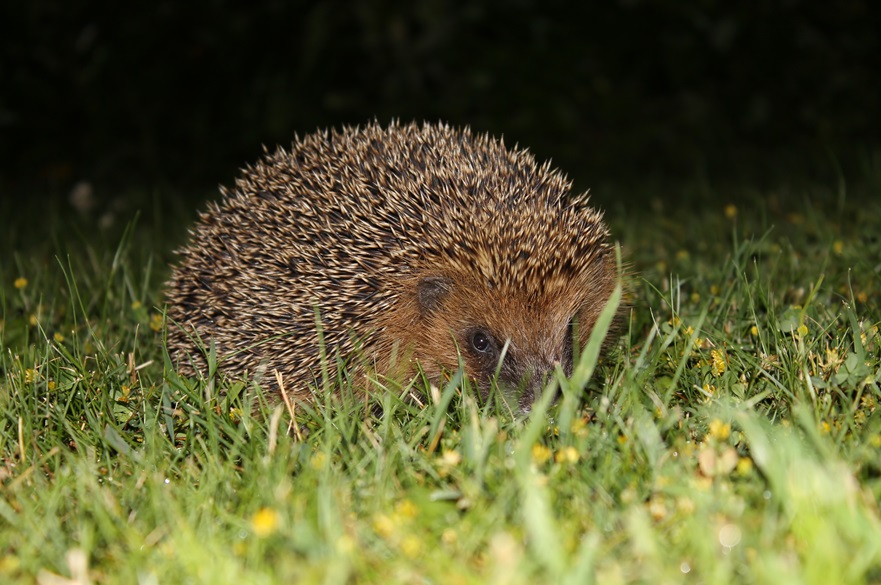People with trail cameras needed for hedgehog conservation study
A new study aims to help monitor native, wild hedgehogs by harnessing the combined potential of personal trail cameras in people’s gardens.
By Dave Rogers | Published on 11 April 2025
Categories: Press office; Research; School of Animal, Rural and Environmental Sciences;

Researchers at Nottingham Trent University are urging people with the sensor- activated cameras, also known as camera traps, to support the project, which it is hoped could eventually help to reveal new information on hedgehog locations and abundance.
Hedgehogs, which are nocturnal, have undergone considerable decline in recent decades and the West European Hedgehog is currently listed as ‘near threatened’ in Europe by the International Union for Conservation of Nature (IUCN).
Capturing new information from private gardens could help support conservation efforts, the researchers say.
Gardens can be challenging areas to study, due to access limitations, yet they remain an important habitat for many urban adapted species.
The project, being led by Nottingham Trent University, aims to tap into a growing number of trail cameras which people are routinely using to view wildlife at home.
‘Spot a hog’ is open to anyone in the UK with a camera trap.
Participants on the project will receive advice on how to adjust and calibrate their cameras, , so that they are suitable for the study.
All the captured images will be submitted to citizen science platform MammalWeb where they will be assessed and the data analysed. If people don't own a camera trap they can still help with this stage by registering as a 'Spotter' to support the team in identifying what is in the images.
The study aims to initially understand if people’s private cameras – and a citizen science approach – can be utilised effectively for estimating garden hedgehog population size. It will then be used for future monitoring programmes.
The project will use a methodology similar to the existing National Hedgehog Monitoring Programme – led by wildlife charities People’s Trust for Endangered Species and The British Hedgehog Preservation Society, and also involving NTU – which uses trail cameras to capture images of hedgehogs in different habitats, including urban parks, woodlands and farmland.
“To identify why hedgehogs are in decline and which habitats sustain healthy hedgehog populations, we need high quality data from across the country,” said Paulina Pawlikowska, who is carrying out the work as part of her PhD research in the university’s School of Animal, Rural and Environmental Sciences.
“Trail cameras are widely used by researchers for wildlife monitoring, with some amazing initiatives, but we know that they are also increasingly used by people to observe wildlife in their gardens. The work is also important as we know that hedgehogs are increasingly observed in urban rather than rural areas.
“We want to test the potential of using privately owned cameras for monitoring the abundance of hedgehogs in our gardens, which will ultimately help with their conservation.
“Anyone who has a camera trap in their garden can contribute their footage to the survey by uploading content to the platform.”
Dr Henrietta Pringle, National Hedgehog Monitoring Programme Coordinator at People’s Trust for Endangered Species and The British Hedgehog Preservation Society, added: ‘The National Hedgehog Monitoring Programme is a pioneering research project that aims to gather new information on native hedgehogs through a world-first combination of trail cameras, AI and home-based volunteers.
“Spot a Hog will perfectly complement this by using the same methods, but empowering people at home to contribute their own camera footage to help conservationists understand urban hedgehog populations.”
Anyone interested in participating in the survey should visit the project’s website.
Notes for Editors
Press enquiries please contact Dave Rogers, Public Relations Manager, on telephone +44 (0)115 848 8782, or via email.
Nottingham Trent University (NTU) has been named UK ‘University of the Year’ five times in six years, (Times Higher Education Awards 2017, The Guardian University Awards 2019, The Times and Sunday Times 2018 and 2023, Whatuni Student Choice Awards 2023) and is consistently one of the top performing modern universities in the UK.
It is the 3rd best modern university in the UK (The Times and Sunday Times Good University Guide 2023). Students have voted NTU 1st in the UK for student employability (Uni Compare 2025)
NTU is the 5th largest UK institution by student numbers, with over 40,000 students and more than 4,400 staff located across six campuses. It has an international student population of almost 7,000 and an NTU community representing over 160 countries.
NTU owns two Queen’s Anniversary Prizes for outstanding achievements in research (2015, 2021). The first recognises NTU’s research on the safety and security of global citizens. The second was awarded for research in science, engineering, arts and humanities to investigate and restore cultural objects, buildings and heritage. The Research Excellence Framework (2021) classed 83% of NTU’s research activity as either world-leading or internationally excellent.
NTU was awarded GOLD in the national 2023 Teaching Excellence Framework (TEF) assessment, as it was in 2019.
NTU is a top 10 for sport (British Universities and Colleges Sport league table 2023).
NTU is the most environmentally sustainable university in the UK and second in the world (UI Green Metric University World Rankings, 2023).